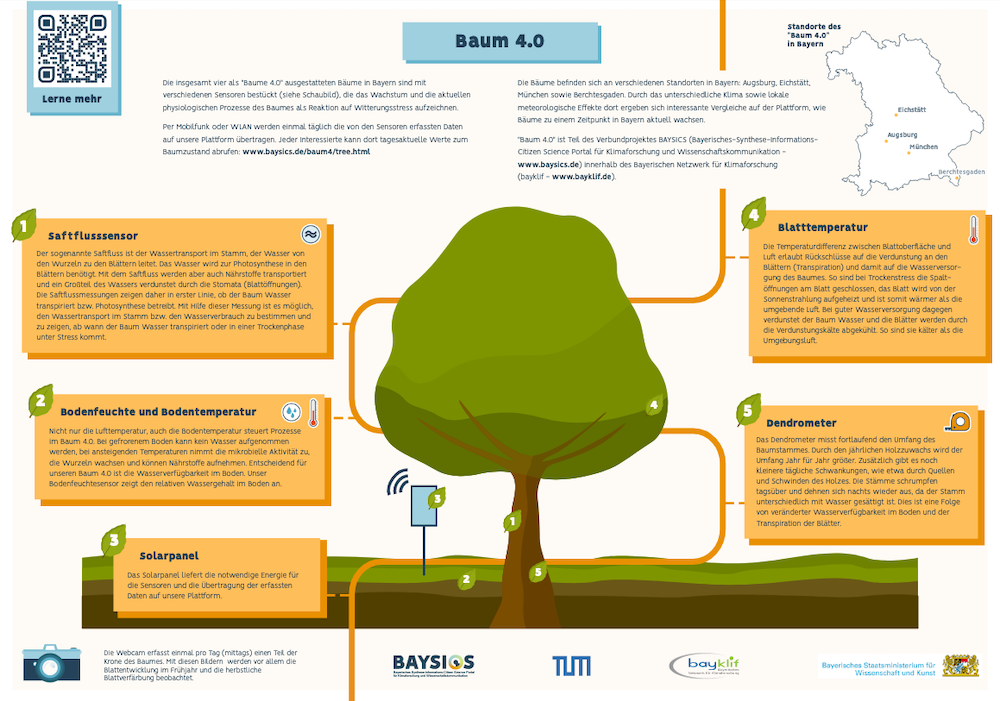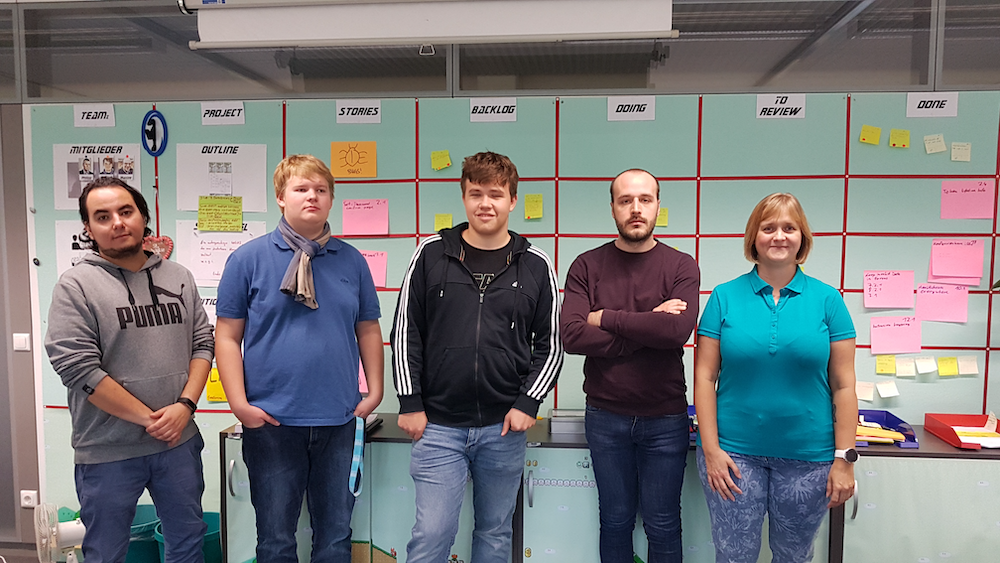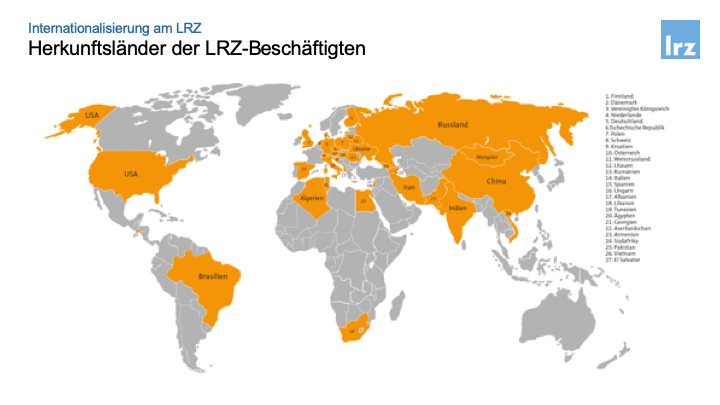LRZ-Newsletter Nr. 1/2020 of January 9th, 2020, eng

Our Topics:
- News
- Workshops and Events
- Deep Learning for Computer Vision
- Deep Learning for more Data Types
- Introduction to Julia for HPC and Machine Learning
- Using Photoshop
- Tricks for Supercomputing
- Programming with OpenMP
- Programming with Fortran
- Working with ANSYS
- Semantic Patching with Coccinelle
- Cyber Security Day 2020
- Data Protection Day 2020
- Sought: Standards for Interfaces
- Job Opportunities
- More to Read
- Informations about the LRZ-Newsletter
- Imprint
News
Making Climate Change Understandable
Height, stem girth, sap flow, leaf temperature, air and soil moisture: four trees from four of Bavaria's climate zones will be measured and regularly photographed in the coming years. The Tree 4.0 project aims to make the reactions to natural and weather phenomena and climate change visible and understandable. In Augsburg, Eichstätt and Munich, the beeches are equipped with various sensors, a web cam, solar panel and WLAN unit and are already providing data. The last tree in Berchtesgaden will be wired and connected to the Internet by spring.
Fitness tracker for trees

"Just like with a fitness bracelet, we can query the vital characteristics of the trees", says Professor Annette Menzel, climatologist at the Technical University of Munich (TUM) and responsible for the Tree 4.0 project, "Are they still growing, are they photosynthesizing, can they still transport water from the soil to the leaves? Measurement data on this allow conclusions to be drawn about the power of the tree and, in the long term, about changes in the weather and the environment.
Tree 4.0 is a project of Bayern 4.0 and part of the Bavarian Synthesis Information Citizen Science Portal (BAYSIC), with which the Free State of Bavaria wants to promote research, make science more transparent and make measurement data accessible. The data from the sensors can be called up on the Internet every hour, and once a day the camera provides an image of the leaves and crown. The necessary infrastructure is being set up at the Leibniz Supercomputing Centre (LRZ) in Garching, where the measurement data from the trees are stored. Open databases ensure that the information from the trees flows quickly and unadulterated to scientists, citizens, schools, kindergartens or companies, where it can be enriched with other data and evaluated or compared as required.
Data for many research and teaching purposes
Menzel's team at TUM focuses on the reactions of plants to water, sun and temperature. Geographers at the Catholic University of Eichstätt are more interested in the inflorescence and pollen flight of tree 4.0 because they are investigating the spread of allergies. Teachers could use images and measurement data to illustrate the seasons and the lifestyles of trees and the animals living in them and set research tasks for pupils.
The goal of Tree 4.0 is also to test the measurement technology and necessary data storage, to develop flexible interfaces to other databases, but above all to build tools with which the information from Tree 4.0 can be processed, evaluated and visualised: For example, it would be conceivable to combine Tree 4.0 with the measurement data of the Electronic Pollen Information Network (ePIN). Furthermore, the LRZ could contribute the experience with apps for nature viewing, which it has gained in cooperation with the Wildland Foundation in the Thalhamer Moos. (vs)
"We can help Shape the Future of HPC"
If you want to program applications for the SuperMUC-NG, you need OpenMP (Open Multi-Processing), one of the most popular programming languages for multicore computers and supercomputers based on Fortran, C and C+++. Like all languages, OpenMP is constantly evolving: The Leibniz Supercomputing Centre (LRZ) has been a member of the OpenMP Architecture Review Board (ARB) since April 2019. Similar to the Duden editorial team for German spelling, the ARB regularly deals with the new elements of OpenMP and standardises them. In February the LRZ offers a three-day OpenMP workshop in cooperation with the Partnership for Advanced Computing in Europe (PRACE) and in May the OpenMP guardians come to Garching to discuss the next innovations. An interview with Volker Weinberg, PhD physicist and coordinator of education and training at the LRZ, about OpenMP, standards and the future of supercomputing
What's OpenMP and why must it be constantly standardized?
Dr. Volker Weinberg: OpenMP is a very popular and established share memory programming model, which was introduced in 1997. The standard became more and more complex with the growing spread of multicore computers and supercomputers. This can be seen in the printed manuals. For my PhD thesis I used a small booklet, today the manual has more than 600 pages and lists hundreds of language constructs. OpenMP now supports not only processors from all leading manufacturers, but also accelerators such as graphics cards. With the standardization comes the hope that new programming models and languages will not always emerge, even though computer technology is constantly changing. This is successful - OpenMP has been working for more than 20 years.
You were just at a standardization meeting of the Architecture Review Board - how is standardization done anyway?
Weinberg: If the maufacturers of chip and compiler or users notice in daily use that they are missing features and functionalities, they can propose additions to the standardization committee. These changes are managed on Github and discussed in detail during the meetings. In Auckland, the international conferences OpenMPCon and IWOMP or the 15th International Workshop on OpenMP, with lectures and tutorials were held first, followed by the face-to-face meeting of the standardization committee. For five days, there were seven-hour sessions each, in which the OpenMP experts discussed individual language constructs - sometimes a bit lengthy, but very intensive and instructive. I was fascinated by how committed people were to the topic and how thoroughly they described the syntax and semantics of OpenMP. After that, there was always a vote on the new features for version 5.1 of the OpenMP standard.
Why is it important that the LRZ is a member of the Architecture Review Board?
Weinberg: The LRZ claims to be one of the leading scientific computing centers in Europe. If we actively participate in OpenMP, we help to determine the future of high performance computing and can better specify the requirements for the successor of SuperMUC-NG. Today, the OpenMP Architecture Review Board has more than 30 members and is a good network for knowledge exchange. In addition to supercomputing centers from all over the world, manufacturers such as AMD, ARM, Cray, Intel and more are involved. Last but not least, the LRZ belongs to the Gauss Centre for Supercomputing of the three German high-performance computing centres. The HLRS in Stuttgart is already a member of the MPI Forum for the standardization of Message Passing Interface, a programming language for distributed systems, which is also widely used and often used with OpenMP. We are now complementing these activities with our participation in the OpenMP ARB.
Two events at the LRZ will deal with OpenMP in 2020 - what can we expect?
Weinberg: Those working with the SuperMUC-NG or other European supercomputers can learn tricks and techniques from renowned OpenMP experts during a three-day PRACE workshop in February and in May we host as a new member the face-to-face meeting of the standardization committee, which brings together OpenMP specialists from all over the world. So we are very close to the innovations and can learn and contribute a lot to OpenMP. (vs)

Share and Exchange
Exchange documents and files: The Leibniz Supercomputing Centre (LRZ) has been making Sync+Share possible for five years within the framework of the BayernShare cooperation. On December 227., 2019, the service was unavailable for one hour for the first time: "We have installed and optimized the latest version of the program", says computer scientist Dr. Bernd Reiner from Leibniz-Supercomputing Centre (LRZ). At the turn of the year, the LRZ will put the practical IT service into regular operation, and funding from the Bavarian Ministry of Science and Research will cease: The 18 universities and institutions using and offering BayernShare, will therefore have to pay 4.50 Euro per year and user. "Whether the organisations pass on the costs to their users is up to them to decide", Reiner continued.
18 universities and almost 160,000 users
LRZ Sync+Share is based on the Powerfolder program, which was developed in 2007 in Düsseldorf by the company Dal33T, is widely used in universities in Hessen and also by the Internet Corporation for Assigned Numbersand Names (ICANN), among others. At the end of 2014, LRZ Sync+Share was initially integrated into the systems at the Leibniz Supercomputing Centre on a trial basis. Since 2015, more and more universities and research institutes have been able to access it.
Today, the service is used at 18 Bavarian universities: About every third user is a student. About 35,000 times a day, the app is opened on any mobile device, while 15,000 times a day the online portal is clicked on to access files such as images, concepts or seminar papers or to securely pass them on to fellow students or lecturers. "With LRZ Sync+Share, users are increasingly exchanging data across Europe," reports Reiner. "All data is encrypted during transmission and is stored on certified servers in Germany". The service therefore complies with the strict European and German data protection regulations. At the LRZ, about four people now ensure that it functions smoothly and can spread further in Bavaria's scientific community.
More intuitive, clearer, more practical
The new LRZ Sync+Share version has become more clearly arranged and allows to upload several files and folders at once, this by the way now also via link. Furthermore the virtual recycle bin helps to clean up personal archives. For security reasons the Uniform Resource Locators (URL) of public folders have been changed. This should not hinder the exchange of files. But: "If partners have problems accessing files, Sync+Share users can resend the invitation with a link", Reiner recommends. (vs)
Learning to Build and Explain Technology
Well arrived: Trainees Philipp, Björn and Luca have already completed their first 100 working days, and their verdict on their first employer is unanimous: "Great", they say at the Leibniz Supercomputing Centre (LRZ): "I get on well with the other trainees and my colleagues", reports Luca, future IT systems electronics technician, and Björn, future IT specialist for system integration, adds: "I get good tasks here".
First IT Specialist Application Development
Philipp is the first IT specialist for application development that the LRZ trains: After graduating from high school, he studied computer science and philosophy for four semesters, but realized that theory was not his thing. He came to the LRZ and his apprenticeship through an internship in spring: "I want to program things that are useful, and because I lack the eye for design and interfaces, I prefer to work for the backend," he says. At the LRZ he was involved in the programming of the last password reset service, and his team is currently working on a software for the administration of the web servers. "This is exciting, and I learn more every day", says Philipp.
Alternation between theory and practice
Luca encouraged his father to start at the LRZ. A trial work day brought even more certainty. In the meantime, he has already helped in the computer cube to lay cables, set up switches and routers: "It's super fun, I'll be on the road for the next four weeks, setting up access points with colleagues in the universities and other institutes, unlocking data sockets and helping with problems". For three years the trio learns at the LRZ to set up and extend networks, to develop software and to install and maintain computers and programs. The practice is regularly interrupted by several weeks of theoretical units at the vocational school in Munich as well as own learning modules. Björn has already worked intensively with Windows programs, Luca with cable types.
Communication and explanation is important
Seminars at the Munich Chamber of Industry and Commerce (IHK) are also on the agenda. "We prepare our apprentices for exams and play through exam situations with them," explains trainer Alessandro Podo. So that the youngsters can also explain technology to users from other fields, they will repeatedly present what they have learned to colleagues from other departments and the three trainees who have been at the LRZ for some time. They will also collect commercial knowledge. "Within the apprenticeship we pay attention to where the interests of our apprentices are directed", adds Petra Gärtner, training coordinator at the LRZ. "So we can plan final theses or job opportunities together."
The next round of applications for trainees is currently underway. The LRZ is searching talents for trainees, if you know young people, please suggest the LRZ for training. In addition, the LRZ offers internships for pupils or students and drop-outs. More information on the LRZ website. (vs)
Number of the month

The LRZ team is international and diverse: People from 36 nations work for Bavaria's leading scientific data center. After Italy, Austria, Spain, Tunisia and India are strongly represented. Incidentally, the origin of employees was evaluated for these statistics, not their last place of residence.(vs)
Workshops and Events
Deep Learning for Computer Vision
Together with NVIDIA's Deep Learning Institute (DLI), the Leibniz Supercomputing Centre is offering a one-day workshop on January 20, 2020 for students, data scientists, and researchers who want to solve challenging deep learning problems. Participants will learn the basics of deep learning, how to use artificial neural networks and how to train with data. They will also be introduced to the tools for developing their own deep learning solutions for specific research projects. Lecturer Juan Durillo Barrionuevo will hold this workshop in English.
Deep Learning for more Data Types
This one-day workshop on 21 January 2020 at the Leibniz Supercomputing Centre (LRZ) in Garching will introduce the basics of deep learning with different types of data. It is aimed at students, staff and researchers from all academic faculties. They will learn how to train a network using programs such as TensorFlow or the so-called MSCOCO data set, for example to create signatures for pictures and videos. Lecturer Juan Durillo Barrionuevo will hold this workshop in English.
Introduction to Julia for HPC and Machine Learning
From 27 to 28 January 2020, participants will get an insight into Julia, a scientific programming language that combines the syntax of Python with the speed of C. During the two days, participants will learn the differences to common programming languages like Python and C++ and learn how to use Julia to program code for GPU or create workflows for machine learning. Lecturers Dr. Oliver Schulz from the Max Planck Institute for Physics and Ludger Pfähler from the Technical University of Munich (TUM) attach great importance to practical training, so that participants will soon be able to implement the presented methods themselves. In English.
Using Photoshop
Digitizing and processing images - this is the focus of this practical course by Klaus Leschhorn on January 2020, 29 at the Leibniz Supercomputing Centre (LRZ). It is designed for employees, students and lecturers who often work with digital images. They will learn how to use Photoshop to brighten up images, correct colours and more. They will also learn about the most important image editing tools and tools, as well as the file formats that Photoshop creates and where they are used. Knowledge of Windows is a prerequisite. The course is held in German.
Tricks for Supercomputing
The 26th International European Conference on Parallel and Distributed Computing is being prepared. Although it will not take place until August, the organizers are now collecting the lecture topics until February 2020, 7. They are looking for papers and topics on practical experiences or new insights into parallel and distributed computing, working with multicore processors, accelerators, supercomputers and the cloud, as well as tools and other technical aids for developing algorithms and applications, and of course the use of artificial intelligence and machine learning. Last but not least, practical work and results from supercomputing will also be presented in Warsaw.
Programming with OpenMP
OpenMP is the programming language for parallel computer systems and enables supercomputing to build specific applications for a wide range of research questions (see article above). Lecturers from various universities as well as from INTEL will introduce participants of this three-day PRACE workshop from February 2020, 11 to 13 at the Leibniz Supercomputing Centre (LRZ) to this powerful programming language and show the tricks with which it helps even advanced users to solve data problems.
Programming with Fortran
Learning programming with Fortran - students can devote three days to this topic at the Leibniz Supercomputing Centre (LRZ): From 26 to 28 February 2020, Dr. Reinhold Bader and Dr. Nisarg Patel will introduce the advantages and disadvantages of the programming language and show how scientists can use it to develop their own applications. Prerequisite is a basic knowledge of UNIX and Linux.
Working with ANSYS
ANSYS is a package of more than 20 applications for engineers and scientists. At the Leibniz Supercomputing Centre (LRZ), CFX and Fluent in particular are used very often to display and calculate flow properties of liquids or gases. A five-day workshop from March 16 to 20 will focus on these programs and their use in a Linux cluster. Dr. Barbara Neuhierl from CADFEM, an IT service provider from Grafing, and Dr. Thomas Frank from the LRZ will explain to students, lecturers and interested parties how they can work with ANSYS and solve their own research questions.
Semantic Patching with Coccinelle
Coccinelle is a valuable tool to check programming in C code or to find and eliminate bugs and errors. On a training day on March 2020, 24. participants will learn how to use Coccinelle, how to identify patterns that indicate errors and how to extract all the benefits from the program for efficient, well-performing code. The last available places will be allocated as a result of the registrations.
Cyber Security Day 2020
Identity abuse, online fraud, phishing, firewalls and much more: On March, 26. there will be another day of lectures on (IT) security at the Garching Research Campus. The Cyber Security Day 2020 is organized and carried out by the Leibniz Supercomputing Center together with the Munich universities and the Gesellschaft für Datenschutz und Datensicherheit (GDD), participation is free of charge. The organizers want to help participants to improve cyber security at work and in private life and to protect their own privacy. No prior technical knowledge is required for participation.
Data Protection Day 2020
The EU Data Protection Basic Regulation, the German Adaptation Act (BDSG) and the Bavarian Data Protection Act (BayDSG) have been in force since May 2018, and in the meantime the supervisory authorities are tightening controls and imposing penalties, so there is still some work to be done by companies to implement the directives. "Help for professionals by professionals" is the motto of the Data Protection Day at March, 27th at the Leibniz Supercomputing Centre (LRZ), the lectures by experts and practitioners will deal with questions on implementation and jurisdiction. Participation is free of charge for data protection officers and other interested parties;: They should have a basic knowledge of data protection and law. The Data Protection Day 2020 is the 81st meeting of the GDD-ERFA-Kreis Bayern.
Sought: Standards for Interfaces
The eighth international workshop around the interfaces OpenCL, SYCL, Vulkan and Spir-V, called IWOCL, will take place at the Leibniz Supercomputing Centre (LRZ) in Garching near Munich from April 2020, 27. to 29. Computer specialists and engineers working on these programming interfaces are now invited to submit field reports on the integration of these interfaces in supercomputing projects as well as proposals for their extension or standardization. The interfaces accelerate and optimize the integration of applications on special processors, such as GPUs or accelerators. They will be important for the development of the next generation of high-performance computers, the exascale computers, which will certainly no longer be able to do without accelerators. The LRZ organizes the event and is involved in the selection of presentations and papers.
Job Opportunitiese
The following positions are currently open at the LRZ. You will find a diverse, international team in Garching. Most job offers are in German – for questions you will find English speaking colleagues here. Don't hesitate to e-mail or phone and send your unsolicited applications. Please visit our website, if you search for other job opportunities.
- IT Specialist System Administration (m/f/d)
- Administrator for the tax department (m,f,d)
- Research assistant VR & Visualization (m,f,d)
- IT systems specialist (m,f,d)
- Student assistant: Web/JavaScript/TypeScript (m,f,d)
- Student assistant for the Licence-Team (m,f,d)
- Student assistants for the Service Desk (m,f,d)
More to Read
Here you will find links to the latest information from the German and European supercomputing community and our cooperation partners:
- Publications of the Gauss Centre for Supercomputing (GCS): GCSNews 26/2019 and Inside.
- Infoletters of the Gauß-Allianz: December/January 2019/20 (PDF: 2p.))
- PRACE: Newsletter
Informations about the LRZ-Newsletter
- The LRZ Newsletter is published in German and English. You can find the latest and former editions on the LRZ-Website.
- You have problems displaying the newsletter? Please send a short description of your problem to <NewsletterRedaktion_AT_lrz.de>. Thank You.
- You can subscribe or unsubscribe the LRZ-Newsletter via our website.
Imprint
- Editor:
- Leibniz-Supercomputing Centre of the Bavarian Academy of Science and Humanties
- Adress:
- Leibniz-Supercomputing Centre of the Bavarian Academy of Science and Humanties
Boltzmannstraße 1
D-85748 Garching - Phone:
- +49-89-35831-8000
- Telefax:
- +49-89-35831-9700
- E-Mail:
- lrzpost_AT_lrz.de
- Editorial Office:
- PR-Team. Photos and graphics: BAYSICS (Tree 4.0), Marvin Meyer/Unsplash (Collaboration, Sync+Share), LRZ
